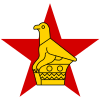
Rhodesia, officially from 1970 the Republic of Rhodesia, was an unrecognised state in Southern Africa from 1965 to 1979. During this fourteen-year period, Rhodesia served as the de facto successor state to the British colony of Southern Rhodesia, and in 1980 it became modern day Zimbabwe.
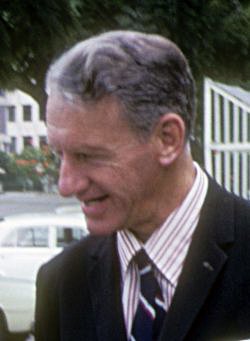
Ian Douglas Smith was a Rhodesian politician, farmer, and fighter pilot who served as Prime Minister of Rhodesia from 1964 to 1979. He was the country's first leader to be born and raised in Rhodesia, and led the predominantly white government that unilaterally declared independence from the United Kingdom in November 1965 in opposition to their demands for the implementation of majority rule as a condition for independence. His 15 years in power were defined by the country's international isolation and involvement in the Rhodesian Bush War, which pitted the Rhodesian Security Forces against the Soviet and Chinese-funded military wings of the Zimbabwe African National Union (ZANU) and Zimbabwe African People's Union (ZAPU).

Zimbabwe Rhodesia, alternatively known as Zimbabwe-Rhodesia, also informally known as Zimbabwe or Rhodesia, was a short-lived sovereign state that existed from 1 June 1979 to 18 April 1980, though it lacked international recognition. Zimbabwe Rhodesia was preceded by another state named the Republic of Rhodesia and was briefly under a British-supervised transitional government sometimes referred to as a reestablished Southern Rhodesia, which according to British constitutional theory had remained the lawful government in the area after Unilateral Declaration of Independence (UDI) in 1965. Following the 1980 Southern Rhodesian general election, the country was granted internationally-recognized independence within the Commonwealth as the Republic of Zimbabwe.

Rhodesia's Unilateral Declaration of Independence (UDI) was a statement adopted by the Cabinet of Rhodesia on 11 November 1965, announcing that Rhodesia, a British territory in southern Africa that had governed itself since 1923, now regarded itself as an independent sovereign state. The culmination of a protracted dispute between the British and Rhodesian governments regarding the terms under which the latter could become fully independent, it was the first unilateral break from the United Kingdom by one of its colonies since the United States Declaration of Independence in 1776. The UK, the Commonwealth, and the United Nations all deemed Rhodesia's UDI illegal, and economic sanctions, the first in the UN's history, were imposed on the breakaway colony. With the help of the Commonwealth Secretariat, members of the Commonwealth were able to cooperate and advise Rhodesian Africans on policy. Amid near-complete international isolation, Rhodesia continued as an unrecognised state with the assistance of South Africa and Portugal.
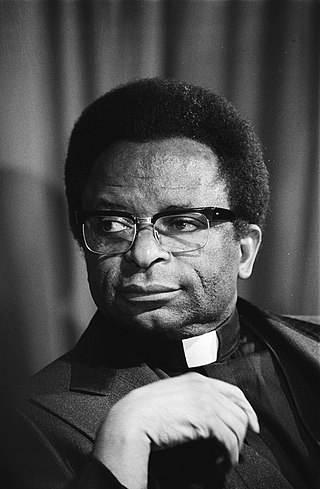
Abel Tendekayi Muzorewa, also commonly referred to as Bishop Muzorewa, was a Zimbabwean bishop and politician who served as the first and only Prime Minister of Zimbabwe Rhodesia from the Internal Settlement to the Lancaster House Agreement in 1979. A United Methodist Church bishop and nationalist leader, he held office for less than a year.

The Rhodesian Bush War, also known as the Rhodesian Civil War, Second Chimurenga as well as the Zimbabwe War of Independence, was a civil conflict from July 1964 to December 1979 in the unrecognised country of Rhodesia.

The Internal Settlement was an agreement which was signed on 3 March 1978 between Prime Minister of Rhodesia Ian Smith and the moderate African nationalist leaders comprising Bishop Abel Muzorewa, Ndabaningi Sithole and Senator Chief Jeremiah Chirau. After almost 15 years of the Rhodesian Bush War, and under pressure from the sanctions placed on Rhodesia by the international community, and political pressure from South Africa, the United Kingdom, and the United States, the Rhodesian government met with some of the internally based moderate African nationalist leaders in order to reach an agreement on the political future for the country.
James Robert Dambaza Chikerema served as the President of the Front for the Liberation of Zimbabwe. He changed his views on militant struggle in the late 1970s and supported the 'internal settlement', serving in the attempted power-sharing governments.
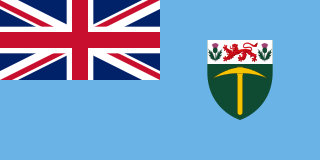
The history of Rhodesia from 1965 to 1979 covers Rhodesia's time as a state unrecognised by the international community following the predominantly white minority government's Unilateral Declaration of Independence on 11 November 1965. Headed by Prime Minister Ian Smith, the Rhodesian Front remained in government until 1 June 1979, when the country was reconstituted as Zimbabwe Rhodesia.

A double referendum was held in Rhodesia on 20 June 1969, in which voters were asked whether they were in favour of or against a) the adoption of a republican form of government, and b) the proposals for a new Constitution, as set out in a white paper and published in a Gazette Extraordinary on 21 May 1969. Both proposals were approved. The country was subsequently declared a republic on 2 March 1970.

Air Rhodesia Flight 825 was a scheduled passenger flight that was shot down by the Zimbabwe People's Revolutionary Army (ZIPRA) on 3 September 1978, during the Rhodesian Bush War. The aircraft involved, a Vickers Viscount named the Hunyani, was flying the last leg of Air Rhodesia's regular scheduled service from Victoria Falls to the capital Salisbury, via the resort town of Kariba.

Zimbabwe and the Commonwealth of Nations have had a controversial and stormy diplomatic relationship. Zimbabwe is a former member of the Commonwealth, having withdrawn in 2003, and the issue of Zimbabwe has repeatedly taken centre stage in the Commonwealth, both since Zimbabwe's independence and as part of the British Empire.

The Geneva Conference took place in Geneva, Switzerland during the Rhodesian Bush War. Held under British mediation, its participants were the unrecognised government of Rhodesia, led by Ian Smith, and a number of rival Rhodesian black nationalist parties: the African National Council, led by Bishop Abel Muzorewa; the Front for the Liberation of Zimbabwe, led by James Chikerema; and a joint "Patriotic Front" made up of Robert Mugabe's Zimbabwe African National Union and the Zimbabwe African People's Union led by Joshua Nkomo. The purpose of the conference was to attempt to agree on a new constitution for Rhodesia and in doing so find a way to end the Bush War raging between the government and the guerrillas commanded by Mugabe and Nkomo respectively.

The Victoria Falls Conference took place on 26 August 1975 aboard a South African Railways train halfway across the Victoria Falls Bridge on the border between the unrecognised state of Rhodesia and Zambia. It was the culmination of the "détente" policy introduced and championed by B. J. Vorster, the Prime Minister of South Africa, which was then under apartheid and was attempting to improve its relations with the Frontline States to Rhodesia's north, west and east by helping to produce a settlement in Rhodesia. The participants in the conference were a delegation led by the Rhodesian Prime Minister Ian Smith on behalf of his government, and a nationalist delegation attending under the banner of Abel Muzorewa's African National Council (UANC), which for this conference also incorporated delegates from the Zimbabwe African National Union (ZANU), the Zimbabwe African People's Union (ZAPU) and the Front for the Liberation of Zimbabwe (FROLIZI). Vorster and the Zambian President Kenneth Kaunda acted as mediators in the conference, which was held on the border in an attempt to provide a venue both sides would accept as neutral.

The modern political history of Zimbabwe starts with the arrival of white people to what was dubbed Southern Rhodesia in the 1890s. The country was initially run by an administrator appointed by the British South Africa Company. The prime ministerial role was first created in October 1923, when the country achieved responsible government, with Sir Charles Coghlan as its first Premier. The third premier, George Mitchell, renamed the post prime minister in 1933.

The Rhodesian mission in Lisbon, the capital of Portugal, operated from September 1965 to May 1975. It was a diplomatic mission representing Rhodesia, initially as a self-governing colony of Britain and, after the Unilateral Declaration of Independence in November 1965, as an unrecognised state. Rhodesia informed Britain of its intent to open a Lisbon mission headed by an accredited representative, independent from the British Embassy in the city, in June 1965. Whitehall refused to endorse the idea but Rhodesia continued nonetheless, and later that month appointed Harry Reedman to head the mission. The British government attempted unsuccessfully to block this unilateral act—Rhodesia's first—for some months afterwards.
William John Harper was a politician, general contractor and Royal Air Force fighter pilot who served as a Cabinet minister in Rhodesia from 1962 to 1968, and signed that country's Unilateral Declaration of Independence (UDI) from Britain in 1965. Born into a prominent Anglo-Indian merchant family in Calcutta, Harper was educated in India and England and joined the RAF in 1937. He served as an officer throughout the Second World War and saw action as one of "The Few" in the Battle of Britain, during which he was wounded in action. Appalled by Britain's granting of independence to India in 1947, he emigrated to Rhodesia on retiring from the Air Force two years later.
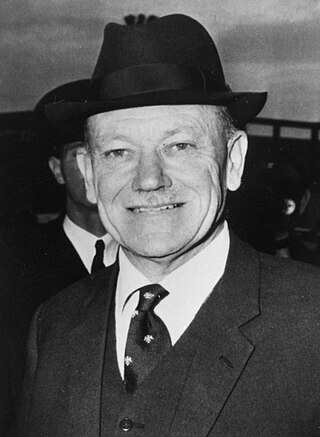
Sir Thomas Hugh William Beadle, was a Rhodesian lawyer, politician and judge who served as Chief Justice of Southern Rhodesia from March 1961 to November 1965, and as Chief Justice of Rhodesia from November 1965 until April 1977. He came to international prominence against the backdrop of Rhodesia's Unilateral Declaration of Independence (UDI) from Britain in November 1965, upon which he initially stood by the British Governor Sir Humphrey Gibbs as an adviser; he then provoked acrimony in British government circles by declaring Ian Smith's post-UDI administration legal in 1968.

The Southern Rhodesia Act 1965 was an act of the Parliament of the United Kingdom. It was designed to reaffirm British legal rule in Southern Rhodesia after Rhodesia had unilaterally declared independence. In practice, it only enforced the status of Southern Rhodesia as a British colony in British constitutional theory as the Rhodesian government did not recognise it.
